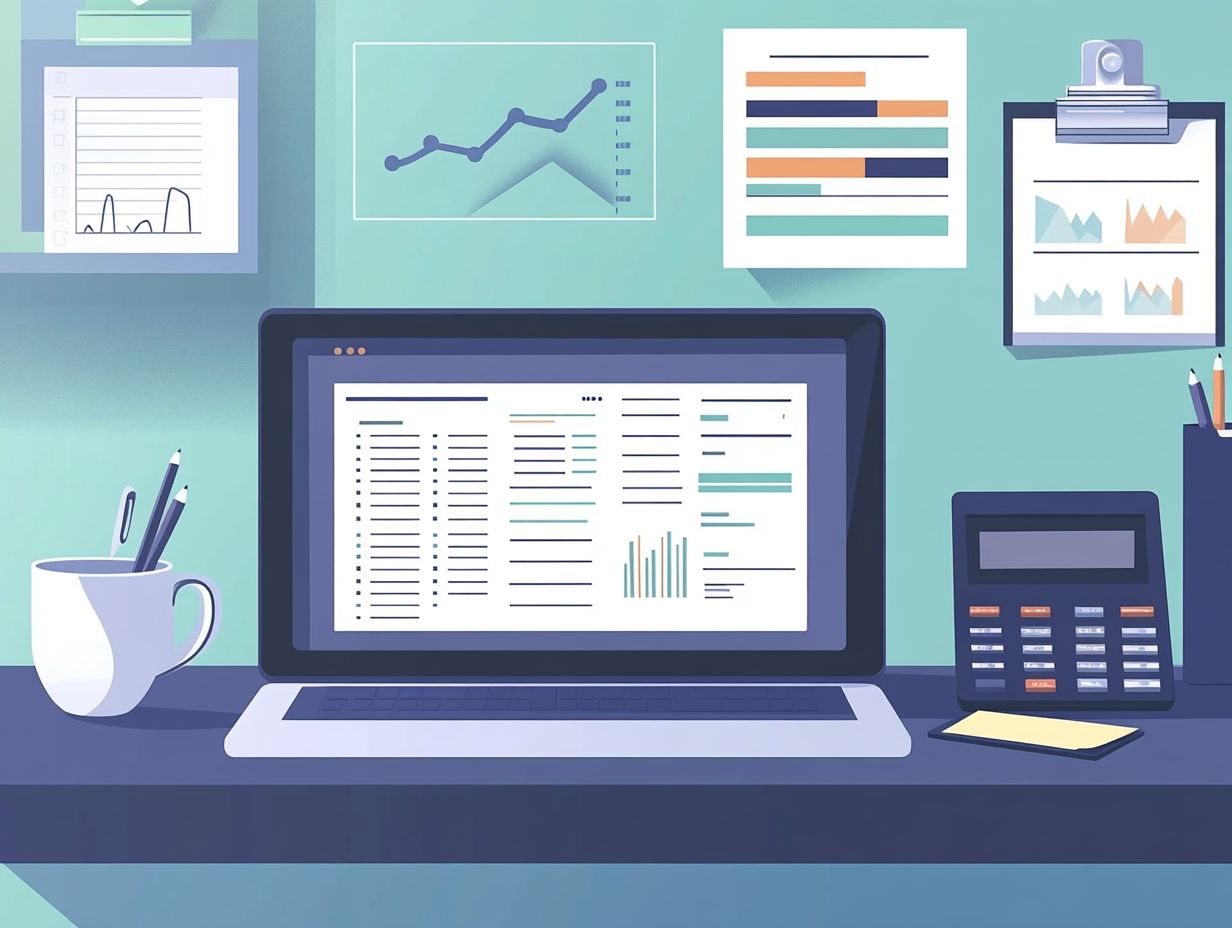How to Financially Plan for Freelance Business Growth
Contents
- Key Takeaways:
- Understanding Your Current Financial Situation
- Setting Financial Goals for Your Freelance Business
- Creating a Budget for Growth
- Managing Cash Flow for Sustainable Growth
- Investing in Your Freelance Business
- Building a Financial Safety Net
- Tracking and Evaluating Financial Progress
- Frequently Asked Questions
- How can I financially plan for my freelance business growth and manage income tax obligations?
- Should I save for emergencies while planning for my freelance business growth?
- Is it necessary to separate personal and business finances in my financial plan?
- What are some ways I can save money while financially planning for my freelance business growth?
- Do I need to pay estimated taxes while financially planning for my freelance business growth?
- How Often Should I Review and Change My Financial Plan for Freelance Business Growth?
Key Takeaways:
- Assess your current financial situation to understand your income and expenses.
- Set short-term and long-term financial goals to guide your budget and investments.
- Create a budget that allocates funds for growth while managing cash flow.
Understanding Your Current Financial Situation
You need to understand your finances as a freelancer. This knowledge helps you plan effectively and achieve sustainable growth.
Freelancers in the U.S. are responsible for paying income taxes and taxes freelancers pay. Tracking these alongside business expenses is crucial.
Financial planning involves analyzing your income, understanding quarterly tax obligations, and preparing for retirement savings and health insurance needs.
Let’s Dive Into Your Income and Expenses!
To evaluate your income and expenses, categorize all your business expenses and track your income streams. This lays the groundwork for understanding your overall financial picture.
Using spreadsheets or accounting software can simplify monitoring your financial situation. This makes it easier to identify trends or patterns in your income and expenses.
Understanding profit and loss is crucial for freelancers. This principle helps you determine whether certain expenses are justifiable and guides your future budgeting decisions.
Setting up payment reminders can enhance cash flow and reduce the risk of late payments. This leads to improved financial planning and more consistent income.
Regularly reassessing your budget allows freelancers to adjust their spending habits. This alignment with personal and business goals is vital for your financial future.
Setting Financial Goals for Your Freelance Business
Establishing financial goals is essential for developing a comprehensive financial plan. This plan can help you achieve long-term objectives like retirement savings and investment portfolio growth.
By setting clear and measurable goals, you maintain focus on your growth. Ensure that your self-employment income is effectively utilized to meet these objectives.
Short-Term and Long-Term Objectives
Setting both short-term and long-term objectives is crucial for maintaining balance in your freelancing business. Short-term objectives typically focus on cash flow needs.
Creating an emergency fund is one of the most important short-term goals. It consists of liquid savings that can be accessed quickly for unexpected expenses.
Long-term objectives often pertain to retirement savings and growing your investment portfolio. These goals facilitate wealth accumulation over time.
It is vital for freelancers to ensure that these differing objectives align with their overall financial goals.
Creating a Budget for Growth
A growth budget helps freelancers strategically manage business expenses. It optimizes profit and loss while preparing for income tax liabilities.
A well-structured budget assists in tracking expenses and allocates funds for necessary investments. This can enhance the profitability of your freelancing endeavors.
Allocating Funds for Investments
Allocating funds for investments is a crucial part of budgeting for freelancers. It helps grow your portfolio and build a nest egg for retirement.
By embracing this practice, you can ensure that your financial decisions are both intentional and sustainable.
Create a detailed budget that covers all your expenses. Set aside at least 20% of your income for investments like stocks, bonds, or mutual funds. Automating these contributions promotes consistency and discipline in saving.
Over time, investing within a well-structured budget can yield significant returns. This contributes to long-term financial health and serves as a safety net for unforeseen life circumstances.
Managing Cash Flow for Sustainable Growth
Effective cash flow management is essential for freelancers aiming for sustainable growth in their businesses. It enables you to budget appropriately for the future, pay expenses on time, and receive income consistently.
Utilizing simple budgeting ideas and setting payment reminders helps you monitor your cash flow and minimize unexpected financial surprises.
Tips for Maintaining Positive Cash Flow
Positive cash flow can be achieved through effective budgeting strategies and systems that incorporate timely payment reminders. Training on how to accurately forecast both income and expenses enables you to gain a clearer understanding of your financial health.
By tracking near-term incoming projects and their expected payments, you can better predict cash flow fluctuations. Consistently monitoring expenses helps ensure that unexpected costs do not adversely affect your financial stability.
Automated payment reminders provide you with the option to nudge clients before payments are due, reducing the likelihood of late payments. Being prepared for income tax liabilities is crucial, as it allows you to set aside the necessary funds for taxes throughout the year, helping maintain stable cash flow.
Investing in Your Freelance Business
Investing in your freelance business is essentially an investment in yourself and your future. It enhances your service offerings and provides diversification and support to your investment portfolio during self-employment.
Forms of investment, such as establishing a Limited Liability Company (LLC) or engaging in corporate investing, can yield significant returns and promote long-term growth.
Identifying Areas for Investment
Identifying areas for investment is essential for freelancers who want to build a robust investment portfolio and effectively support their retirement savings. Focus on sectors such as education, technology, and marketing to increase your income and create opportunities for professional growth.
Investing in online courses can enhance your skill set, ensuring you remain competitive in a constantly evolving market. Additionally, utilizing the latest technologies can streamline processes, improving efficiency and earning potential. Investing in effective marketing techniques can also expand your client base and boost sales.
Establishing a business LLC gives you legal protection and tax benefits.
Building a Financial Safety Net
A financial safety net is essential for freelancers to prepare for unexpected expenses and ensure financial stability in self-employment.
It is important to budget for emergency funds, explore health insurance options, and manage debt effectively when necessary.
Preparing for Unexpected Expenses
Freelancers must build a strong financial safety net capable of absorbing unexpected expenses without disrupting their operations. This can be achieved by adhering to a strict budgeting process that documents regular income and anticipated fixed costs. This approach highlights areas for potential savings.
Setting aside a specific amount for an emergency fund each month not only protects against unforeseen events but also fosters peace of mind. Effective debt handling is crucial; freelancers should prioritize paying down high-interest debt first or consider consolidating loans.
By following these guidelines, freelancers can cultivate a proactive approach to financial stability and ensure they are equipped to weather any challenges.
Tracking and Evaluating Financial Progress
Monitoring and evaluating financial progress enables freelancers to understand their financial status, see how well they’re doing, and make informed decisions related to profit and loss, expense tracking, and income tax obligations.
Regular evaluations help freelancers measure their savings for retirement and identify areas of their finances that require improvement.
Measuring Success and Making Adjustments
Evaluating success as a freelancer involves measuring financial progress through profit and loss statements and tracking expenses. By examining these financial metrics, freelancers can gain insights into their earning and spending behaviors, allowing them to make informed improvements.
For instance, by understanding their revenue streams and closely monitoring costs, they can determine how much time and effort to invest in specific projects. This method drives them closer to achieving their business goals and often leads to greater profitability.
In a competitive market, checking your finances regularly enables freelancers to adapt their strategies, maintain flexibility, and ensure they continue to work toward their overall objectives.
Frequently Asked Questions
How can I financially plan for my freelance business growth and manage income tax obligations?
There are several steps you can take to financially plan for your freelance business growth. First, create a budget and stick to it. This will help you keep track of your expenses and income. Second, set financial goals for your business, such as reaching a certain income level or saving a specific amount each month. Lastly, invest in tools and resources that will help your business grow, such as marketing materials or hiring additional help.
Should I save for emergencies while planning for my freelance business growth?
Yes! It is important to have an emergency fund set aside while planning for your freelance business growth. This will provide a safety net in case of unexpected expenses or a decrease in income. Make sure to include this in your budget, and try to save at least 3-6 months’ worth of expenses.
Is it necessary to separate personal and business finances in my financial plan?
Yes, it is crucial to keep your personal and business finances separate in your financial plan. This will help you accurately track your business expenses and income, and make tax season easier. Consider opening a separate business bank account and using accounting software to keep your finances organized.
What are some ways I can save money while financially planning for my freelance business growth?
There are several ways you can save money while financially planning for your freelance business growth. First, negotiate with your vendors and suppliers for better pricing. Second, take advantage of free or low-cost marketing and networking opportunities. Lastly, consider using freelancer-friendly tools and resources, such as free project management software or affordable training courses.
Do I need to pay estimated taxes while financially planning for my freelance business growth?
Yes! If you expect to owe $1,000 or more in taxes for the year, you are required to pay estimated taxes while financially planning for your freelance business growth. This will help you avoid penalties and interest charges for underpayment of taxes. Consult with a tax professional to determine your estimated tax payments.
How Often Should I Review and Change My Financial Plan for Freelance Business Growth?
Review your financial plan for your freelance business at least once every three months. This practice helps you track your progress and meet your financial goals.
You can also review your plan monthly if you feel it’s necessary. Staying proactive puts you in control of your business growth!










